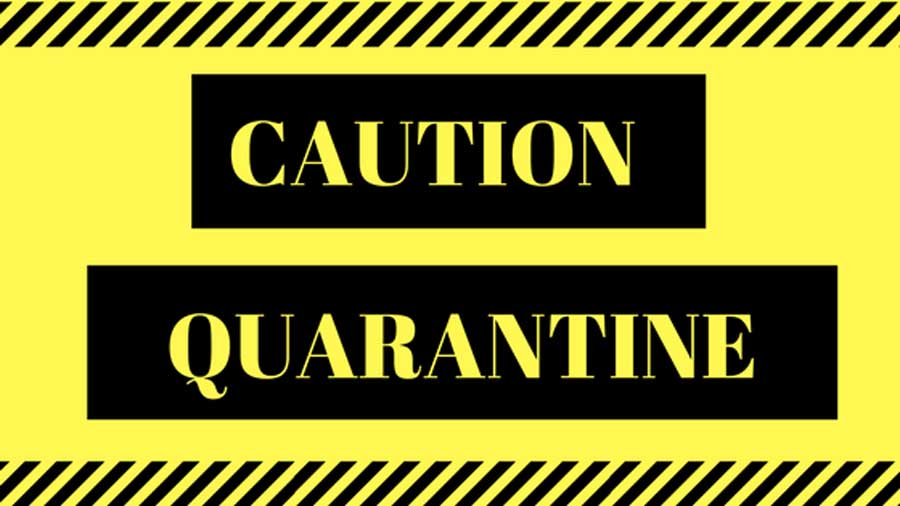
I’ve always been a BIG ADVOCATE of quarantine.
Well, I guess always isn’t quite the right word, because, like most people, I thought I could get away without quarantine when I first started. And I had devastating infestations more than once.
Okay. I’m also a bit stubborn.
The reason I started to write about this great hobby in 2009 was to try and help others avoid the mistakes I have made—and failing to quarantine or properly quarantine is probably the biggest mistake I’ve (repeatedly) made.
That is why, up until today, I’ve been a quarantine evangelist, which may be the only time in those words were placed sequentially in the history of the English language.
Ever since the OSRAS conference in April, I’ve been wondering if quarantine is even enough.
Quarantine
The word quarantine implies three important things to keep your tank safe:
- Isolation
- Observation
- Time
Isolation
Isolation, meaning you keep your new animals separate from the animals in your tank.
Observation
Observation, meaning that you watch the animal for signs of illness (and treat)
Time
Time, because if you do the first two steps for a sufficient length of time, then you can feel relatively assured that you can safely add the animal to your display tank.
A recent development
Up until a few months ago, this all sounded like a great thing. But here’s the thing—when I buy a new fish at the store, I’m looking at the fish and system—and they don’t look infected. Most of the time, things are fine, or so I tell myself.
Most of the time spent in quarantine is just waiting. I’m American. We don’t wait for anything.
Statistically speaking, you already stopped reading this article, in favor of clicking on some other internet thingy right now.
Which creates its own weird time/space conundrum—how could you be reading this right now if, statistically speaking, you’ve likely already stopped reading?
Squirrel! Ok. I’m back.
While I’m observing the fish in quarantine, am I actually deliberate, thorough and diligent enough to ensure I’ve inspected the animal every single day and have ruled out all possible issues?
How many of us are actually even qualified to do so?
How long are you going to wait?
Finally, how long is really long enough? Conventional wisdom is that you should wait about a month—because that’s the typical life cycle of a few of the more common problems—I know I’ve passed along that advice—but is it really enough?

If we just take a look at the scientific evidence about saltwater ich outbreaks, there was a study where saltwater ich survived in systems (later to cause an outbreak) for 72 days (mentioned here). Another study showed that the cysts lived for 4-5 months before becoming parasitic (mentioned here)
So if a parasite like ich has been proven to be problematic for as long as 5 months…and that only accounts for 1 parasite, how long should we just sit around and wait in quarantine until the coast is clear?
The problem
The problem with traditional quarantine practices is that we wait one month, then dump our fish up. We don’t want to ‘find anything’ during quarantine, because then it just extends that awful period of waiting, and on top of it, we need to do a physical exam of the fish every single stinking day—who has time for that?
A lesson learned from watching zombies
I think I’ve been watching too much of The Walking Dead lately, but what I realized is that quarantine is just sitting around and waiting. You know what happens when you sit around and wait? You get eaten by zombies.
Maybe THAT is why nobody really quarantines the right way. It’s a good idea, it adds a layer of perceived protection—but what is the actual protection it conveys, and at what cost?
Instead of sitting around waiting to see if the zombies come to us, we should go out and clear the zombies.
That’s where I think the smart people at Roger Williams University got things right. They recently published their methods for preventing the zombie apocalypse in Coral Magazine, and it’s not really just quarantine—it’s a decontamination or delousing.
You can find their methodology published here or in Coral magazine.
If you knew that every animal you brought in was carrying the zombie virus, and you had a method to get rid of the zombie virus, you wouldn’t just sit around and watch them waiting to see if they looked like they were going to turn, would you?
Changing my tune
So, I am officially changing my tune. It’s not about advocating for quarantine anymore, it’s about removing parasites from the fish in our systems.
I encourage you to check out the full article from Coral Magazine that highlights the Roger Williams Method for quarantine and pest elimination
They combine medications with hyposalinity and the transfer method to eliminate parasites from the fish before they enter their system.
But even if you add one of these three anti-parasite steps to your quarantine observation process, you’ll at least be taking a proactive step in eliminating parasites, instead of hoping they don’t show up and that you’re paying attention enough to catch them, in the first place.
If you won’t join me in quarantine and hoping the parasites won’t come to us, will you join me in attacking them instead?
Albert B. Ulrich III
Author of SaltwaterAquariumBlog.com and the Reef Aquarium Book Series









0 Comments